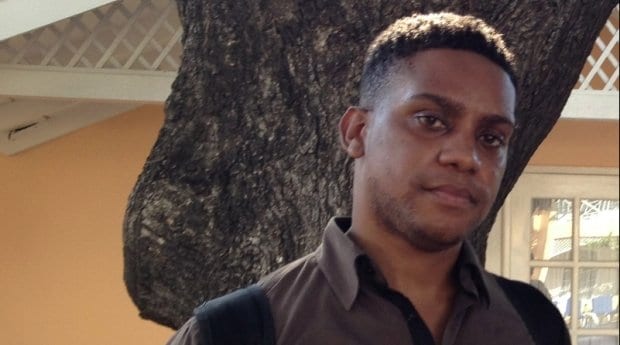Jermaine, a gay Jamaican man, knows what it’s like to live on the streets.
“You have to fight against the weather — night cold, sun, rain,” he told me on a recent trip to Jamaica. “Hurricane season come an’ ketch me on de road a’ready.”
At 18, Jermaine often found himself locked out of his home, his mother telling him to “go back where mih a come from,” while his father tried a little harder to wrap his head around his son’s sexuality.
“They didn’t understand about the whole gay and all ah dat,” Jermaine says. “They weren’t taught in school how to handle situations like dat.”
For two or three years, he led an itinerant street life, punctuated by sofa surfing at the homes of sex-work clients and friends — until they wanted him out.
“Hygiene was a major issue,” he says. “If you want a job, the way you look, the way you smell — the first impression … didn’t cut it.”
His first step off the streets was to find a reliable water source and clothing. Then came a job, classes in English, food preparation and other life skills. While volunteering at the Jamaica Forum for Lesbians, All-Sexuals and Gays (J-FLAG), he started an empowerment session out of which four people found jobs and another six went back to school.
His “whoa” moment came when the United Nations Population Fund approved his request for $1.5 million (Jamaican) to train 10 HIV-positive gay sex workers in health and employment-seeking strategies, using a peer-education format.
The government wasn’t falling over itself to help, so Jermaine started to help himself, and then his peers.
“I can’t tell you when, because you are going to hold me [to it] if I give you a timeline,” Prime Minister Portia Simpson-Miller recently told Jamaican media when asked about her 2011 promise to review the country’s archaic buggery law.
Simpson-Miller followed that serving of political evasion with another slice of obfuscation. “We are so busy trying to hold things and to see … whatever decisions we take — because we have to take tough decisions — that it doesn’t impact in a very serious way the majority of our people.”
Would it matter if Jamaica’s parliamentarians legalized gay sex? It would certainly be a sign of forward movement, but with more than 80 percent of Jamaicans self-describing as homophobic, a victory on that score won’t translate into societal acceptance.
That’s long-game work, which is ongoing but proceeding in baby steps, whether it’s outreach to potential allies in religious circles, convincing media to eschew sensationalism for more balanced reporting about LGBT people and their experiences, or working within and outside the community to address the interconnected issues of marginalization, unemployment, and homelessness among men who have sex with men.
According to a 2012 University of the West Indies study on the attitudes and perceptions of 1,000 Jamaicans regarding same-sex relationships, these are the stats activists are up against: “Approximately 88 percent felt that male homosexuality was immoral, 83.7 percent felt the same for female homosexuality and 83.5 percent felt bisexual relationships were immoral.”
These findings represent a six to eight percent increase in intolerance since 2011, the study shows.
Jermaine’s friend Christopher thinks change is more likely to occur “behind doors.” The very people who think nothing of shouting homophobic slurs in the streets will show a different side of themselves when there is no public to consume their venom, he suggests.
Even as he tries to embrace his sexuality and how to express it, Christopher refers to himself as “gay and …” He’s trying to integrate into society as a “precautionary measure.”
Jermaine says accessing education, employment and housing without harassment is key. “This country still don’ reach dat level.”
Natasha Barsotti is the staff reporter at Xtra Vancouver.


 Why you can trust Xtra
Why you can trust Xtra


